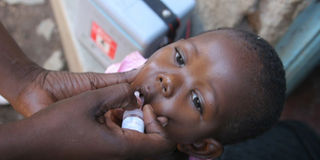Kakamega, Mandera lead in counties with unvaccinated children

A child receives polio immunization. PHOTO | FILE|NATION MEDIA GROUP
What you need to know:
- Kiambu, Turkana, Garissa, Isiolo, Marsabit and Wajir did not provide their vaccination information to the ministry.
- The June 2017 to May 2018 study says about 584,157 children in Kenya have not been vaccinated.
Mandera, Kisii, Kakamega, Nairobi and Trans Nzoia counties have the highest number of children who have not been vaccinated, the Ministry of Health says.
According to information made public on Friday, the number of such children in Mandera County stands at 33,696.
Mandera is followed by Kisii with 30,000 children, Kakamega (28,934), Nairobi (27,278) and Trans Nzoia (26,070).
Other counties with low vaccination rates are Kilifi with 25,559 children, Narok (25,246), Bungoma (22,271), Homa Bay (19,833), Siaya (18,537) and Nandi (17,922)
Lamu County has the lowest number of such children at only 1,225.
It is followed by Embu with 3,062, Laikipia (4,240), Kirinyaga (4,300), Tharaka-Nithi (4,555) and Taita-Taveta (5,072).
VACCINATION INFORMATION
Kiambu, Turkana, Garissa, Isiolo, Marsabit and Wajir did not provide their vaccination information to the ministry.
The June 2017 to May 2018 study says about 584,157 children in Kenya have not been vaccinated.
While releasing the report, the head of the Health Promotion Unit at the ministry, Dr Sammy Mahungu, said the high numbers were as a result of county governments not prioritising immunisation.
Dr Mahungu also blamed the dire situation on last years' prolonged health workers’ strike that paralysed operations public hospitals.
“Before devolution, immunisation in most parts of the country stood at 70 per cent. That means Kenya was almost hitting the 80 per cent target. After devolution, however, it has dropped to less than 50 per cent in most counties,” Dr Mahungu told the Nation.
Missing vaccination exposes children to debilitating diseases such as polio, pneumonia, meningitis, measles, influenza and hepatitis.
HEALTH THREATS
These diseases, long identified as among the biggest health threats in the region, could ravage the nation in the coming years if these children are exposed to their vectors.
Health experts say it is not easy to measure the gravity of the situation.
“Vaccination is the safest way to protect children and pregnant women from a long list of serious and potentially life-threatening illnesses,” Dr Walter Otieno, a Western Kenya-based paediatrician, says.
“Vaccines protect children by preparing their immune system to recognise and fight deadly infections. When a child misses a vaccine and there is an attack, for instance, the likelihood of that child going down with the virus is high.”
Dr Mahungu said devolved governments need to allocate funds for immunisation to meet the demand and reach to the children who have been left out.
“We must move with speed to cover these children. Failure to do that means the country is staring at a serious health problem,” he said.
DOCTORS STRIKES
According to the 2018 Economic Survey, the strikes by doctors and nurses last year and lack of commitment cost the country the gains in immunisation coverage, with Kenya recording a 15-year low of 63 per cent.
With the worrying statistics, the government launched a 100-day immunisation campaign targeting more than 400,000 children below five who missed out on six essential vaccines.
This, President Uhuru Kenyatta said, was informed by the high number of children who went unvaccinated due to the health workers’ strike.
He said the failure to immunise children would not only undermine the health and human dignity but also occasion a national risk such as a disease outbreak.
“This campaign should be sustained and repeated if necessary until we achieve our target of full immunisation coverage of 100 per cent,” he said.
The President flagged off motorcycles to be used in the campaign in remote areas of the country.
“These were the most affected areas and we do not want to see any child left behind. We must ensure all regions are covered,” Mr Kenyatta said.




